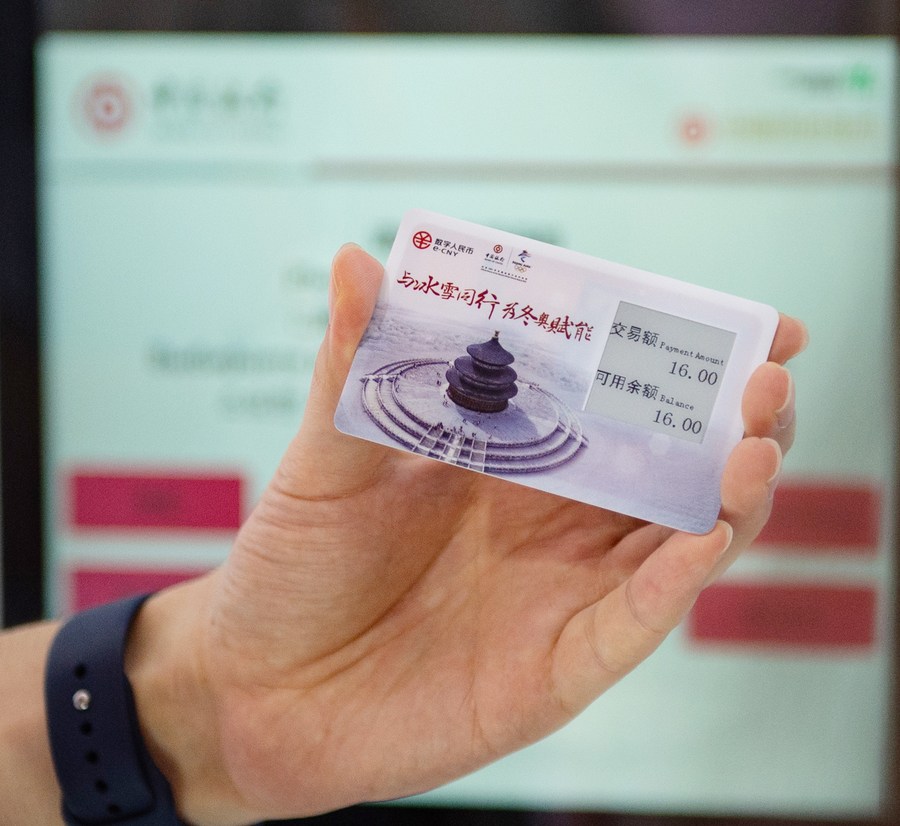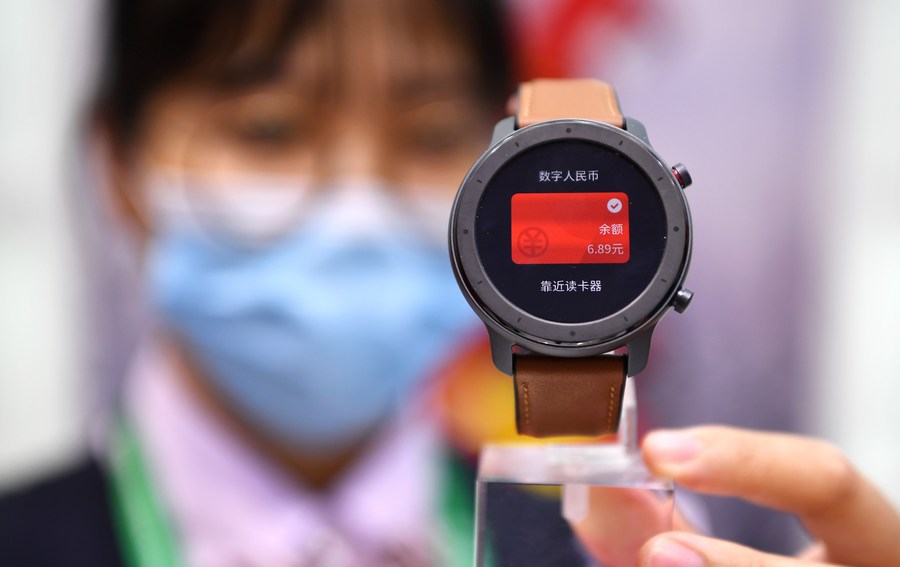China fast-tracks digital yuan trials for Beijing Winter Olympics

A visitor demonstrates e-CNY payment card during the 2021 China International Fair for Trade in Services (CIFTIS) in Beijing, capital of China, Sept. 4, 2021. (Xinhua/Chen Zhonghao)
BEIJING, Dec. 2 (Xinhua) -- Pilot scenario construction for using China's digital fiat currency, or the e-CNY, during the Beijing 2022 Winter Olympics has entered a final sprint as part of the country's efforts to promote the new payment form.
All construction of the digital yuan payment scenarios was completed in the offices of the Beijing Organizing Committee for the 2022 Olympic and Paralympic Winter Games, said the People's Bank of China (PBOC), the central bank.
Payment scenarios are all in place for venues in the Zhangjiakou competition zone in Hebei Province. Other venues in Zhangjiakou have seen contracts for payment scenarios signed or related arrangements with merchants made.
Consumers can use the e-CNY either through wallet apps installed on their mobile phones or via physical wallets in the forms of cards and wearables such as smart watches and ski gloves or badges to meet their diversified needs.
Users can easily obtain or open digital yuan wallets at branches of the Bank of China, self-service machines, and some hotels during the upcoming Olympics.

A staff member displays a mobile payment terminal for digital Chinese yuan (e-CNY) at the first China International Consumer Products Expo in Haikou, capital of south China's Hainan Province, May 8, 2021.(Xinhua/Guo Cheng)
The e-CNY is the digital version of fiat currency issued by the PBOC and operated by authorized operators. The e-CNY system aims to create a new form of RMB that meets the public demand for cash in the digital economy era.
"China is now seeing wide-ranging retail sales scenarios for the digital yuan," said Che Ning, a researcher at the China University of Political Science and Law.
In addition to government and public service payment projects, digital yuan payments also quickly cover a variety of commercial scenarios, Che added.
During the Beijing Winter Olympics, consumers can use digital yuan widely - not only at the venues but also for various services, including transportation, catering, accommodation, shopping, sightseeing, healthcare, telecommunications, and entertainment.
For instance, some infrastructure supporting digital yuan payments are available at tourist attractions such as the Badaling Great Wall, the Palace Museum, and the Old Summer Palace.

A staff member receives money from a tourist using digital RMB with a POS reader at the Happy Valley Beijing theme park the in Beijing, capital of China, June 16, 2021. (Xinhua/Chen Zhonghao)
At present, over 110 countries are at "some stage" of exploring central bank digital currency (CBDC), PBOC governor Yi Gang said in an earlier speech.
"The CBDC allows central banks to continue to provide a credible and secure means of payment in the digital era while improving efficiency and integrity of the payment system," said Yi.
As of Oct. 22, a total of 140 million personal wallets for digital yuan had been opened, official data showed. The number of pilot scenarios has exceeded 3.5 million.
Pilots of the digital yuan have rolled out in ten Chinese cities, including Beijing, Shanghai, and Shenzhen.
The e-CNY was also adopted at the fourth China International Import Expo held in early November, where consumers could pay with the new form of RMB at restaurants, booths, and vending machines.
Looking ahead, the digital yuan will be applied in more situations and also in the securities sector. Beijing authorities recently unveiled several fintech innovation pilot programs in the capital market, including one on digital yuan application in the securities industry.
Despite smooth progress, China's policymakers remained cautious about the CBDC's financial stability and privacy protection.
To minimize the negative implications of the digital yuan, China has positioned e-CNY as M0, or cash in circulation, that bears no interest, thus reducing competition with banks for deposits, Yi said.
As for privacy protection, Yi said that data collection relating to the CBDC will follow the principle of "anonymous for small-value and traceable for large-value transactions." Yi pledged that the amount of data gathered for the CBDC would be less than existing e-payment instruments.
Photos
Related Stories
- What's so special about the ice in National Speed Skating Oval
- Landscape projects for 2022 Winter Olympics upgraded
- Music flash mob brings together Chinese and Finnish voices for the 2022 Winter Olympics
- International youth look forward to Beijing 2022
- Chinese, Greek youth create artworks to send best wishes to Beijing 2022
Copyright © 2021 People's Daily Online. All Rights Reserved.










